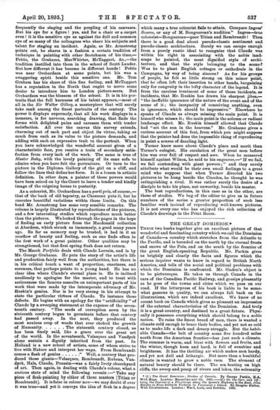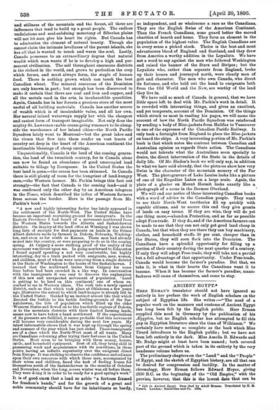THE GREAT DOMINION.*
THESE two books together give an excellent picture of that wonderful and fascinating country which we call the Dominion of Canada—a country which stretches from the Atlantic to the Pacific, and is bounded on the north by the eternal frosts and snows of the Pole, and on the south by the frontier of the great English-speaking Republic. Mr. Parkin gives us brightly and clearly the facts and figures which the serious inquirer wants to know in regard to British North America, and tells of the social and political problems with which the Dominion is confronted. Mr. Sladen's object is to be picturesque. He takes us through Canada in the cars of the Canadian Pacific Railway, and gossips pleasantly as he goes of the towns and cities which we pass on our road. If the letterpress of his book is liable to be some- what gaseous in quality, we can always fall back on the illustrations, which are indeed excellent. We know of no recent book on Canada which gives so pleasant an impression of the external characteristics of the Dominion. And truly it is a great country, and destined to a great future. Physi- cally it possesses everything which should belong to a noble nation. To raise the finest breed of men, there is wanted a climate cold enough to brace their bodies, and yet not so cold as to make life a dark and dreary struggle. But the habit- able Canada—the belt of country some five hundred miles north from the American frontier—has just such a climate. The summer is warm, and blest with flowers and fruits, and the winter, though keen and hard, is full of sunshine and brightness. It has the thrilling air which makes men hardy, and yet not dull and lethargic. But more than a healthful climate is wanted to grow a noble race. The element of natural beauty should be there. The sea beating on high cliffs, the sweep and pomp of rivers and lakes, the solemnity • (1) The Great Dominion : Studies of Canada, By George Parkin, M.A. With Nape. London: Macmillan and Co. 1895.—(2.) On the Cars and Off bang the Journal of a Paqrimage along the Queen's Highway to the Bast. from Habfaz in Nova Scotia to Victoria in Vancouver s Island. By Douglas Sladen. With Illustrations. London : Ward, Lock, and Bowden. 1895.
and stillness of the mountain and the forest, all these are influences that tend to build up a great people. The endless undulations and soul-subduing monotony of Siberian plains will not let man give his heart its rights. But Canada has to admiration the element of natural beauty. Though she cannot claim the intimate loveliness of the parent islands, she has all that is wanted to touch and warm the soul. Lastly, Canada possesses to an extraordinary degree that natural wealth which man wants if he is to develop a high and per- manent civilisation. The soil throughout enormous districts is the richest in the world, and grows to perfection the crop which forms, and must always form, the staple of human food. There is nothing grown which can touch the best Canadian wheat. The mineral resources of the Dominion are only known in part ; but enough has been discovered to make it certain that there are coal and iron and copper, and all the metals used in the arts, in inexhaustible quantities. Again, Canada has in her forests a precious store of the most useful of all building materials. Canada has another source of wealth which is of incalculable value, and all her own. Her natural inland waterways supply her with the cheapest and easiest form of transport imaginable. Not only does the mighty St. Lawrence enable ocean-going steamers to lie along- side the warehouses of her inland cities—the North Pacific Squadron lately went to Montreal—but the great lakes and the rivers that flow into them confer on vast tracts of country set deep in the heart of the American continent the inestimable blessings of cheap carriage.
Unquestionably, Canada is the land of the coming genera- tion, the land of the twentieth century, for in Canada alone can now be found an abundance of good unoccupied land suitable to tillage by Europeans. In the United States the best land is gone,—the cream has been skimmed. In Canada there is still plenty of room for the hungriest of land-hungry men,—the Western farmer. Mr. Parkin brings this fact out strongly—the fact that Canada is the coming land—and it was confirmed only the other day by an American telegram in the Times, which described the influx of Western farmers from across the border. Here is the passage from Mr. Parkin's book :—
" A new and highly interesting factor has lately appeared in the settlement of the North-West. The United States have become an important recruiting-ground for immigrants. In the Eastern Provinces I had heard of a movement northward from the Western States towards the Alberta and Saskatchewan districts. On inquiry at the land office at Winnipeg I was shown long lists of receipts for first payments on lands in the Prince Albert districts made by farmers in Dakota, Nebraska, Washing- ton, and even as far south as Kansas. These men had already pawed into the country, or were preparing to do so in the coming spring. At Calgary a more striking proof of the reality of the movement was thrust upon me. In going northward to Edmonton I found myself spending a not very comfortable, but highly interesting, day in a train packed with emigrants, men, women, and children, most of whom were removing from a single district in the State of Washington to the banks of the Saskatchewan. I learned that the northward trains from Calgary for some time before had been crowded in a like way. In conversation with the immigrants it was easy to discover the explanation of this new and unexpected movement of population. 'Land is getting to be land on this continent,' one of whom re- marked to me in Western idiom. The rush into a newly opened district, such as that which took place at Oklahoma a few years ago, illustrates the extent to which land-hunger is already felt in the United States. Guided by an instinct almost like that which directed the buffalo to the fertile feeding-grounds of the Sas- katchewan, the tide of population which filled up the older 'Western States and flowed on to the less fertile regions of Dakota, Dr, to the mountain districts with their limited farming lands, seems now to have taken a bend northward. If the expectations of its pioneers are fulfilled, it seems probable that this movement will become very considerable during the next few years. My latest information shows that it was kept up through the spring and summer of the year which has just ended. These immie'rants are of a class which the North-West most of all wants. 'Many are Canadians returning after trying their fortunes in the United States. Most seem to be bringing with them money, horses, asttle, and household equipment. Best of all, they bring skill in pioneering work and acquaintance with its conditions, in these points having an infinite superiority over the emigrant direct from Europe. It was striking to observe the confidence and reliance upon their own resources with which these men, accompanied by their wives and children, faced the task of finding homes for themselves north of the Saskatchewan in the months of October and November, when the long, severe winter was all before them. They were doing it in order to be ready for a good spring's work."
It is of good omen that a land so noble "a fortress framed for freedom's hands," and for the growth of a great and noble community should have for its inhabitants so hardy,
so independent, and so wholesome a race as the Canadians, They are the English Swiss of the American Continent. Than the French Canadians, none guard better the sacred charities of hearth and home. They form an element in the population of the highest value. The English Canadians are in every sense a picked stock. Theirs is the best and most adventurous blood of England and Scotland, and they drew from America a worthy addition in the Loyalists. We have not a word to say against the men who followed Washington and raised the banner of the Stars and Stripes; but the Loyalists who, rather than separate from England, broke up their homes and journeyed north, were clearly men of grit and character. The men who own Canada, who direct its fortunes, and who hold out the hand to emigrants both from the Old World and the New, are worthy of the land they live in.
We have said so much of Canada in general, that we have little space left to deal with Mr. Parkin's work in detail. It is crowded with interesting things, and gives an excellent, and yet temperate, account of the Dominion. Of the things which struck ns most in reading his pages, we will name the account of how the North Pacific Squadron was reinforced by sending a body of Blue-jackets from Halifax to Vancouver in one of the expresses of the Canadian Pacific Railway. It only took a fortnight from England to place the Blue-jackets on board the ships. A very interesting portion of Mr. Parkin's book is that which notes the contrast between Canadian and Australian opinion as regards State action. The Canadians would not tolerate what the Australians seem specially to desire, the direct intervention of the State in the details of daily life. Of Mr. Sladen's book we will only say, in addition to what we have said already, that the pictures show how very Swiss is the character of the mountain scenery of the Far West. The photogravure of Lake Louise looks like a picture of one of the Engadine Lakes on a large scale. Again, the plate of a glacier on Mount Hermit looks exactly like a photograph of a scene in the Bernese Oberland.
We will end our notice of these interesting Canadian books with a word of advice to the Canadian people. They want to see their North-West territories fill up quickly with capable citizens, and to secure this end they give grants of lands on easy terms. If they are wise, they will do yet one thing more,—abandon Protection, and as far as possible adopt Free-trade. If they do, and if the American farmers can be made to see that they can not only get good land cheap in Canada, but that when they are there they can buy machinery, clothes, and household stuffs 30 per cent. cheaper than in the States, they will soon flock into the Dominion. The Canadians have a splendid opportunity for filling up a portion of their country during the next quarter of a century. If only they will adopt Free-trade, they will take not a partial but a full advantage of that opportunity. Under Free-trade, Canada would become the farmer's paradise. Bat that, we take it, is what in their hearts the Canadians want it to become. When it has become the farmer's paradise, manu- factures will come of themselves, and come to stay.



































 Previous page
Previous page